Among the vineyards and fruit farms of South Africa’s Western Cape, the mysterious death of a farmworker reveals a violent history.
As the sun set behind the jagged Langeberg mountains, Rosina Cloete extinguished a cigarette in the ashtray on the couch next to her, then stood up and immediately lit another on the gas stove across the small, dank room. The wall behind the stove was blackened with smoke and mold. Rosina left the house, discarded her cigarette at the end of the block, and set off up a steep hill to Cedras Prins’ house, hoping to find out where her husband was.
It was March 27, 2015, the end of the harvest in Ashton, a rural agricultural town in the fertile Breede River Valley in South Africa’s Western Cape. At this time of year, it was common practice for locals from the dilapidated townships and informal settlements on either side of the “white part of town,” as the center of Ashton was still generally known, to descend the hillside toward the region’s rolling vineyards and expansive fruit farms. There, they’d collect a bag or two of the surplus fruit that was otherwise left to rot on the fringes of the farms or used for animal feed. Though technically this often meant trespassing, it was a widely-accepted tradition that stretched back to the 17th century, when thousands of slaves from Asia and other parts of Africa toiled in these same fields, fueling the burgeoning economy of the Dutch Cape colony.
A couple of hours earlier that afternoon, Colin Cloete had decided that the ferocious midday heat had dissipated sufficiently for him to join this annual fruit gathering expedition. He’d slung a small, tattered gym bag over his shoulder and told Rosina he’d be back by sundown with some tomatoes for the family’s pot.
Rosina knew that Colin, unemployed for almost two years, never left the house for long; with nowhere to be and little money to spend, there were few reasons to linger outside the home. He should have been back by now, and his family, having not eaten since morning, was hungry. A friend of Colin’s lived in a ramshackle breezeblock house just next to the Cloete household. He said he’d heard gunshots while gathering fruit and pointed Rosina in the direction of Prins for further details.
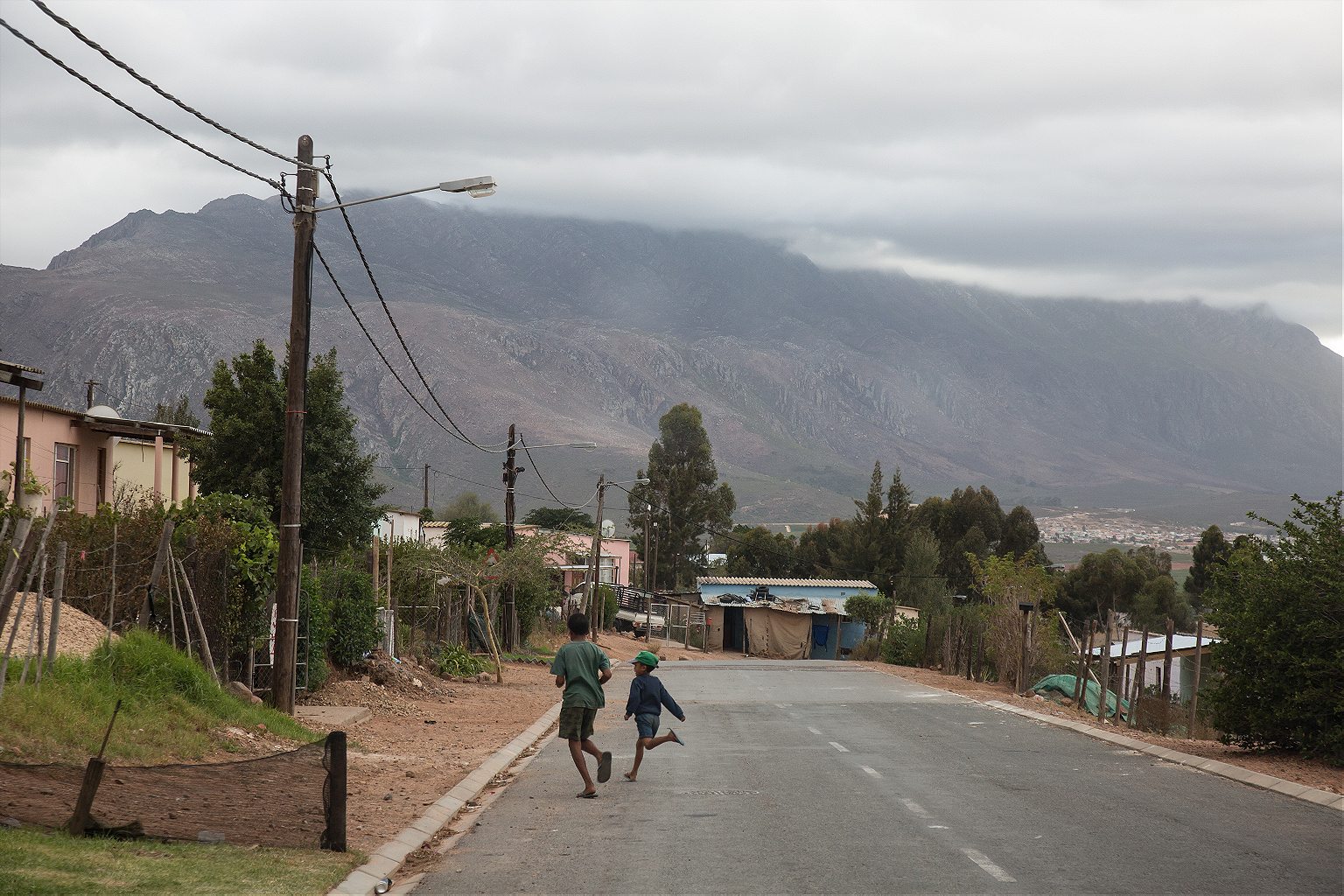
On reaching the top of the hill, Rosina found Prins slumped against the wall outside his house, sitting on an upturned water bucket, his face bloodied and swollen. Prins told Rosina that he’d last seen Colin and a few other men from the neighborhood on a tomato farm that belonged to a young and affluent local farmer named Colin Conradie.
Prins had left the others and pushed his luck by going to pick some naartjies (mandarins) on a prime commercial plot beyond the tomatoes, where he told Rosina he’d been caught by the farm supervisor, Jerome Erasmus, who held him captive until the farmer showed up and started beating him for trespassing. Prins said that while he was being beaten, he’d heard the farmer and the supervisor talking about other men that had been caught on the wrong side of the commonly-respected boundaries in their fruit gathering; Prins assumed Colin was one of them.
Increasingly concerned, Rosina gathered a few family members from her house and went to look for her husband in the fields. But after a couple of hours combing the long, neat rows of vines and verdant fruit trees, it was pitch black. The search party gave up and went home.
Just before dawn the next morning, Rosina rose from a restless night and returned to Conradie’s farm, this time with local police detective Jonathon Franse, whom she’d cajoled into coming with her. Franse knocked on the farm supervisor’s door and asked if he’d seen Colin.
Erasmus, a small, lean, bespectacled man with a gentle smile, led Franse and Rosina down a dirt track to the far end of a nearby vineyard adjoining Conradie’s tomato farm, where he said he’d seen Colin being held by the farmer’s son, while the farmer himself was still a couple of hundred feet away laying into Prins.
When Erasmus and the others arrived at the spot where he’d last seen Colin, his bag was lying on its side on a patch of grass with a few plump, ripe tomatoes spilling out of the top. The group began to skirt the edge of the vineyard and not more than a hundred yards from the abandoned bag, Franse spotted something among one of the rows of vines. He ducked under the metal wires which the vines were trained along and there, in the clearing, face down on the dry, cracked soil, was a body. Franse called Rosina over. “Is this your husband?” he asked. Rosina couldn’t bear to look; she already knew it was Colin.
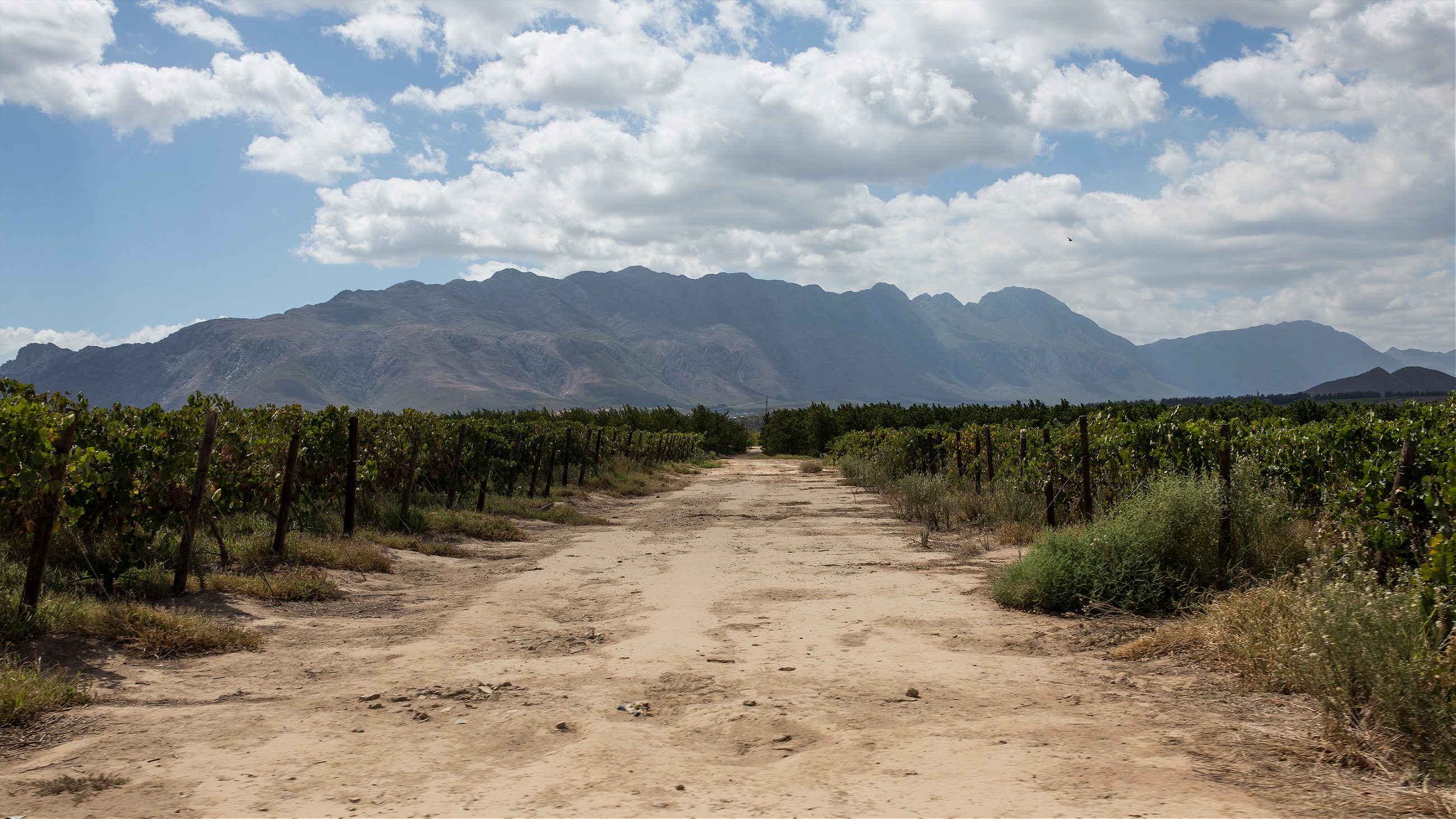
Almost exactly two years later, I meet Rosina at the small two-bedroom house she shares with her three children, four grandchildren, and a severely-disabled niece whose mother, Rosina’s sister, passed away from cancer a few years ago (cancer also claimed one of Rosina’s own children in 2016). Rosina clears some crumpled laundry from the couch and sits down heavily. She looks tired; her chestnut brown eyes are tightly-framed by deep lines and partially-obscured by locks of jet-black synthetic curls. Her voice croaks from years of smoking.
“Colin was a people’s person,” she says in Afrikaans. “He loved people, he loved life. He was well-known in the community. He would always lend a hand to anyone. People couldn’t believe it when he was killed like that, left there like a dog.”
Married for 24 years, Rosina, now 56, met Colin under unusual circumstances; he struck up a conversation with her while she was visiting a friend in a prison in which he was also an inmate. They began exchanging letters and fell in love, marrying when Colin was released.
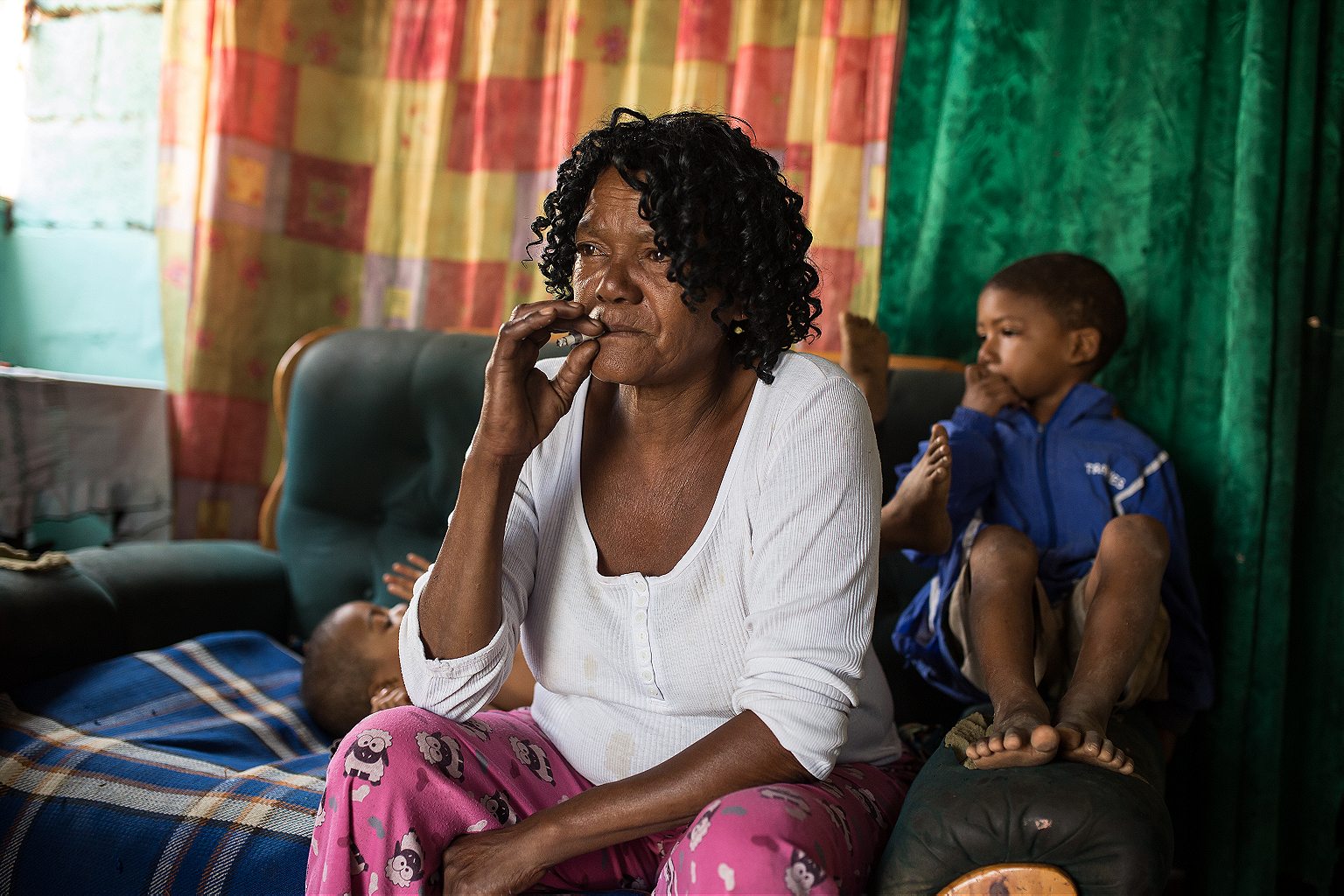
As Rosina and Colin took the plunge into married life, South Africa was undergoing a period of radical change, with the repressive apartheid regime hurtling towards its inevitable end, and Nelson Mandela walking free after 27 years in prison.
Though far from the urban hubs that became the major fault lines in the final throes of apartheid, Ashton was not immune to the violent unrest that engulfed so much of South Africa at the time. In the late 1980s in the impoverished township of Zolani, designated a ‘blacks-only’ area by apartheid’s Group Areas Act, a pro-regime vigilante group called the Amasolomzi terrorized the local community, operating in collusion with the Ashton police force. A few years later, the Truth and Reconciliation Commission would hear scores of testimonies of torture, shootings, assault, and arbitrary arrests by members of the Amasolomzi (as well as revenge-killings by the community against suspected Amasolomzi members).
In 1990, a wave of peaceful protests swept across Ashton and two nearby towns in response to the systematic and persistent oppression in the region’s black African and colored townships (“colored” was the apartheid designation for people of mixed racial heritage or indigenous Khoisan descent, and is still widely used today). As well as being terrorized within their communities, people of color were routinely being exploited, abused, and sometimes killed on local farms.
When the protests began, Michael Weeder, now the Dean of St. George’s Cathedral in Cape Town, had just taken up a position as the local parish priest in Ashton. He was the first non-white priest the Boland region—in which the town of Ashton is located—had ever seen. Weeder would later testify to the Truth and Reconciliation Commission about his time in Ashton, lamenting the “hidden lives lost over the forgotten years on some obscure farm.”
Weeder says that the protests of 1990 were met with severe police brutality, in the face of which the initial fervor quickly “faded into oblivion.” The glaringly uneven balance of power that had persisted since the first slaves were put to work on the farms remained largely intact. “The spatial geography of apartheid has proved very resilient to change in the Cape Winelands,” Weeder says. “Land, land ownership, and the wealth associated with that are still firmly entrenched within white capital. For black people, moving out of the cycle of poverty is still very difficult without access to land.” (Weeder generally uses “black” to refer to all people of color).
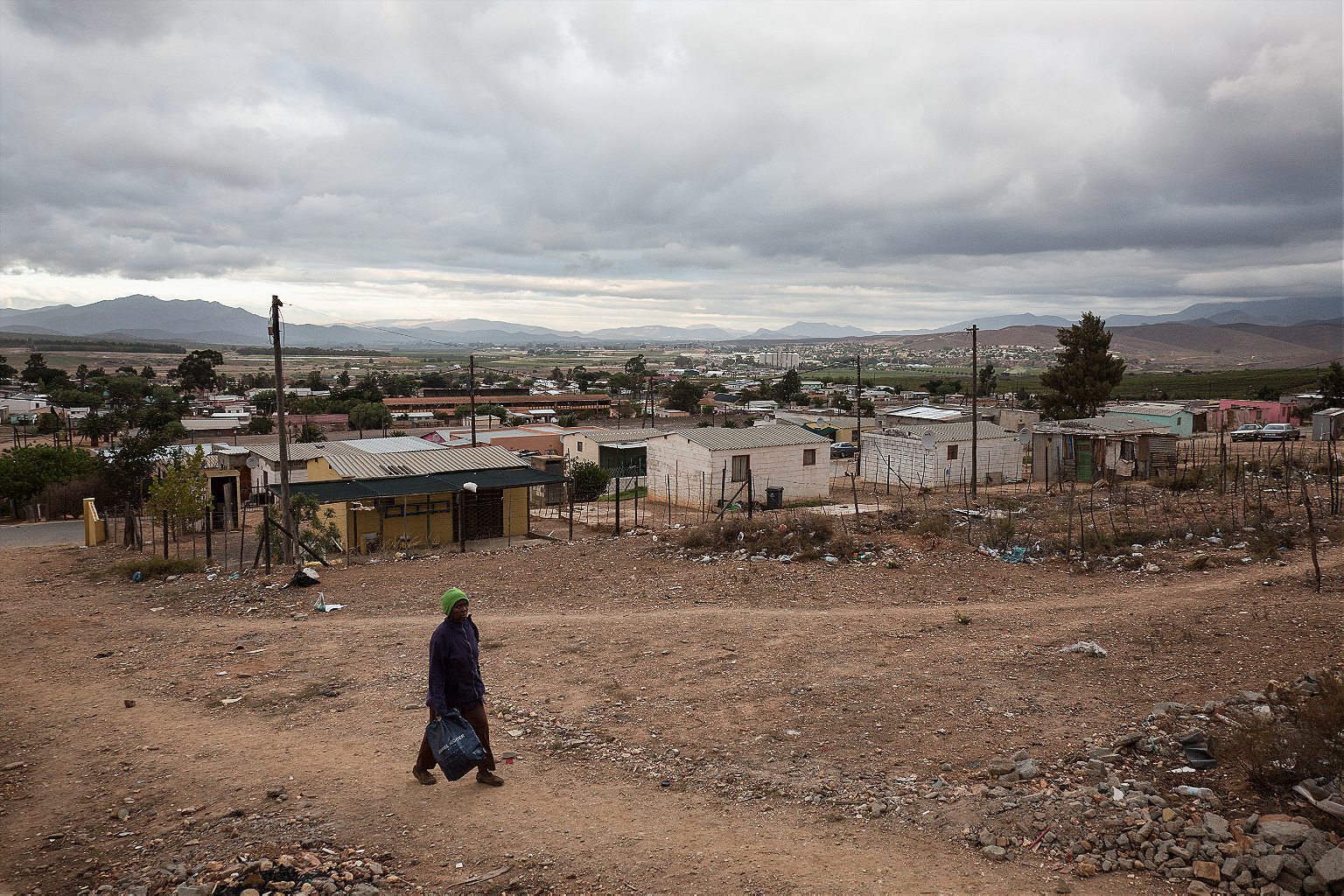
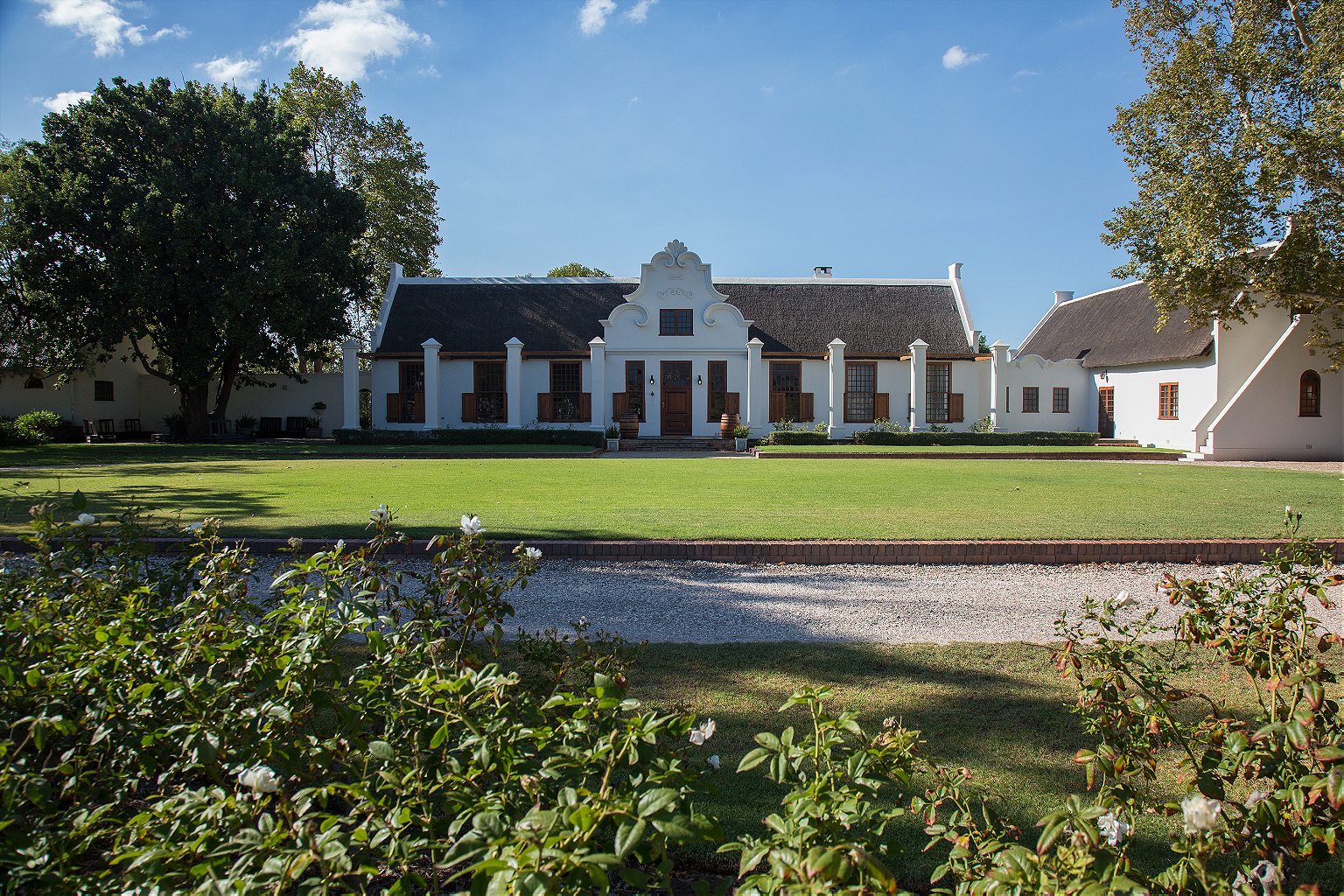
Weeder explains that this “vicious cycle” is the product of a long history of constant dispossession, stemming all the way back to the indigenous Khoisan (many farmworkers today still have Khoisan ancestry), who were forced by the Dutch and British colonialists to “live like squatters in crowded camps on their own ancestral lands.”
“Then came slavery, which brought another layer of trauma. Even after emancipation, there was no truth or reconciliation. There wasn’t even a basic concept of any kind of reparations. The black community then found itself being led into apartheid, which sees an already traumatized community fractured even further. Even now, the Boland is still a very traumatized place both in terms of the land and the people.”
According to a Human Rights Watch study published in 2011 and entitled Ripe with Abuse, black and colored farmworkers on fruit and wine farms in the Western Cape remain “among the most vulnerable citizens in South African society.”
These conditions and abuses sparked widespread strikes and protests in the Western Cape’s agricultural sector in 2012 and 2013. More recently, in 2016, a three-month strike against poor pay and alleged racist practices at Robertson Winery coincided with the release of a controversial Danish documentary called Bitter Grapes, which exposed what it called “slavery in the vineyards” of the Western Cape. The film was fiercely criticized as biased by a South African wine industry that claims to have been unfairly besieged by recent bad press.
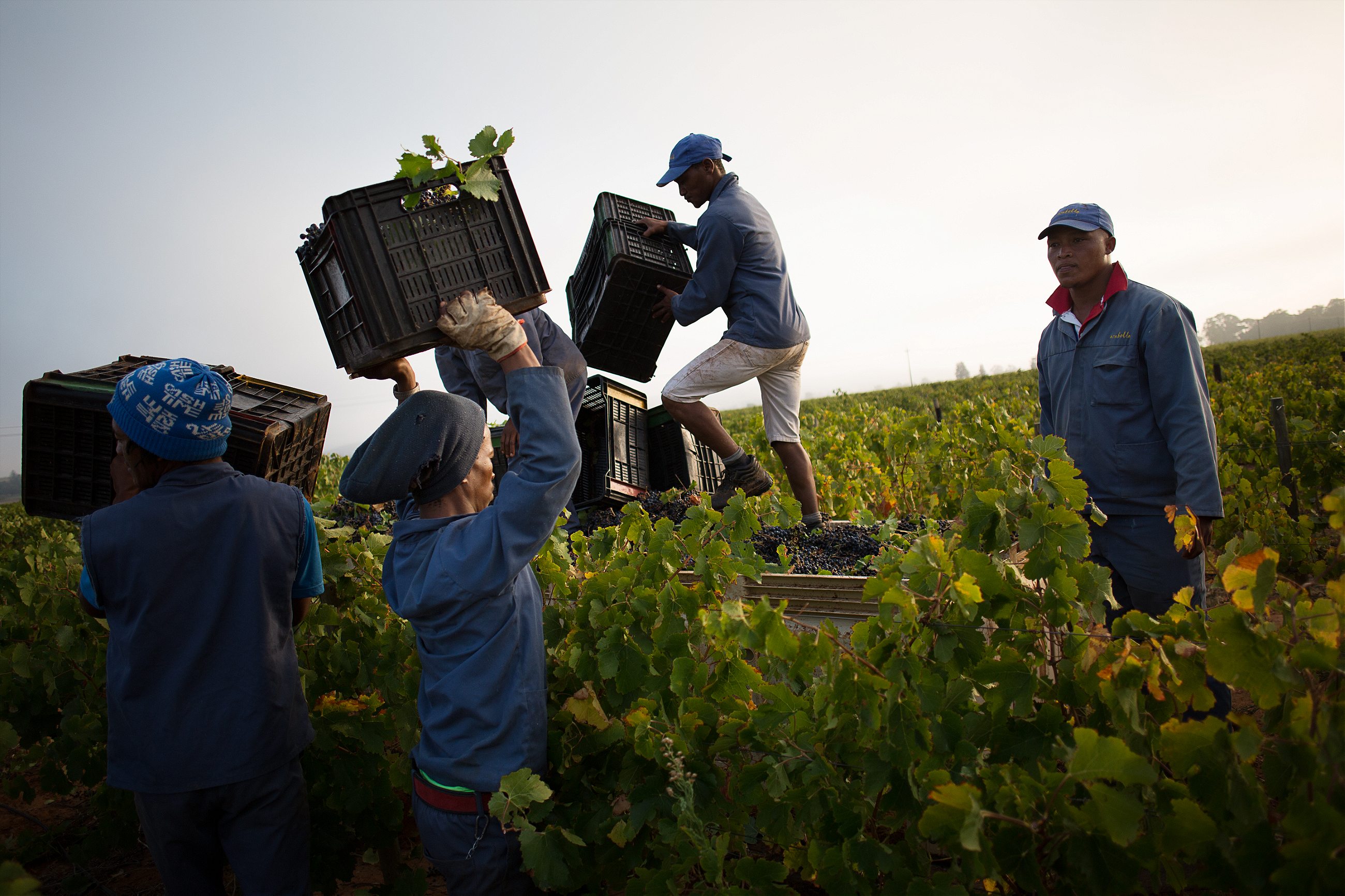
Shirley Davids has long been outspoken on the abuse of farmworkers’ rights on farms in the Cape Winelands. She’s a broad-shouldered, combative paralegal with a contagious, cackling laugh and a crude sense of humor. She runs a small organization called the Rural Legal Centre, which provides legal assistance and advice to farmworkers in the Cape Winelands, and works closely with the Commercial, Stevedoring, Agricultural, and Allied Workers Union (CSAAWU), currently the biggest farmworkers’ union in the Western Cape, with over 3,000 members. Born on a farm in Paarl, where her parents still work, Davids was actively involved in the strikes and protests of both 2012-13 and 2016.
At the end of April 2015, Davids also helped to organize a small march in Ashton, calling for the arrest of Colin’s killer. A forensic report suggested that Colin had died from “unnatural causes”; according to Dr. Denise Lourens, who carried out the post-mortem, the body showed “evidence of trauma” that was consistent with having been beaten with a blunt object. When I spoke to her recently, Lourens also quelled lingering rumors that Colin, an asthmatic, had died from an asthma attack, though she cautioned that her report had shown some signs of “natural disease.”
The group of marchers, Rosina Cloete among them, made their way through Ashton to the police station, where several of the protesters, including Cedras Prins, lodged their own complaints both against the tomato farmer, Colin Conradie, whom many locals were fingering for Colin’s murder, and against the police in the area, whom they accused of corruption and ineptitude. Davids told the smattering of local media that witnessed the march: “We want justice for people living in poor communities like this one. We also want to ensure that the police in this area treat people equally. There have been so many delays in this case and the community wants to know why no arrests have been made. Many other people have also come forward with complaints about abuse by this same farmer.”
I first met Davids at her office in September 2016. Our conversation was sporadically interrupted by workers from local farms or fruit canning factories who came to seek her assistance with an array of issues, including alleged verbal and physical abuse by their employers, unlawful eviction from their homes on farms, and receiving empty pay slip envelopes.
Davids was not in a good mood. The previous day, Prins had withdrawn his case of assault with intent to do grievous bodily harm against Conradie, having apparently agreed to an out-of-court settlement on the morning that his case was due to be heard. This followed a number of postponements that dated back to March 2016 and was confirmed by Conradie’s lawyer, who declined to comment further (and who has repeatedly refused to put me in touch with his client). Without its star witness, Colin’s murder case fell apart and was thrown out.
Davids was evidently disappointed with Prins, whom she said had not told her or the lawyer she’d assigned to defend him that he would be taking a settlement and withdrawing his case. But she understood why he had done it: the injuries he’d sustained in the assault had kept him out of work ever since, and he’d become increasingly desperate for money. Some days, Davids said, he’d been going without any food. His lawyer, Marius Abrahams, told me over the phone that every time he went to see Prins at home, Prins would ask him for money for food.
Farmers can get away with murder
Davids’ primary concern, however, was that the withdrawal of Prins’ case had dealt a major blow to Rosina, whom she had been assisting ever since Colin’s body was found. The investigation into Colin’s death and Prins’ assault had been put on the same case docket by Franse at the Ashton Police Station. If Prins had gone through with the trial and won his case, it would have lent considerable weight to a murder case against Conradie. “Now we basically have to start all over again,” Davids told me.
But there is little precedent to suggest that Prins would have won his case, or that even if he had, it would have led to any swift justice for Rosina. A resigned Marius Abrahams was well aware of this. By way of an example, he told me the story of Anton Mtonjeni, who was left brain-damaged after allegedly being beaten with metal pipes by a group of his white superiors on a farm in Rawsonville, about an hour’s drive from Ashton, back in 2006. Mtonjeni’s mother also claimed that a woman who was lodging with her at the time had been raped while Mtonjeni was being beaten. More than ten years later, this case has still not been resolved. “There’s a clear bias against farmworkers. Farmers can get away with murder,” Abrahams told me. He also said there were problems with “weak prosecution” and “corrupt police officers” and that people being paid off by farmers is “the norm.”
Mercia Andrews, Director of the Trust for Community Outreach and Education (TCOE), an organization focused predominantly on land rights and rural poverty which also funds the Rural Legal Centre, says she has dealt with “hundreds of these kinds of cases of abuse.” One of the major challenges to achieving justice in such cases, Andrews says, is that “people often tend to backtrack at critical moments. They lose the confidence to pursue their cases. Many farmworkers don’t even report these kinds of incidents in the first place, because they still have no sense of their rights.”
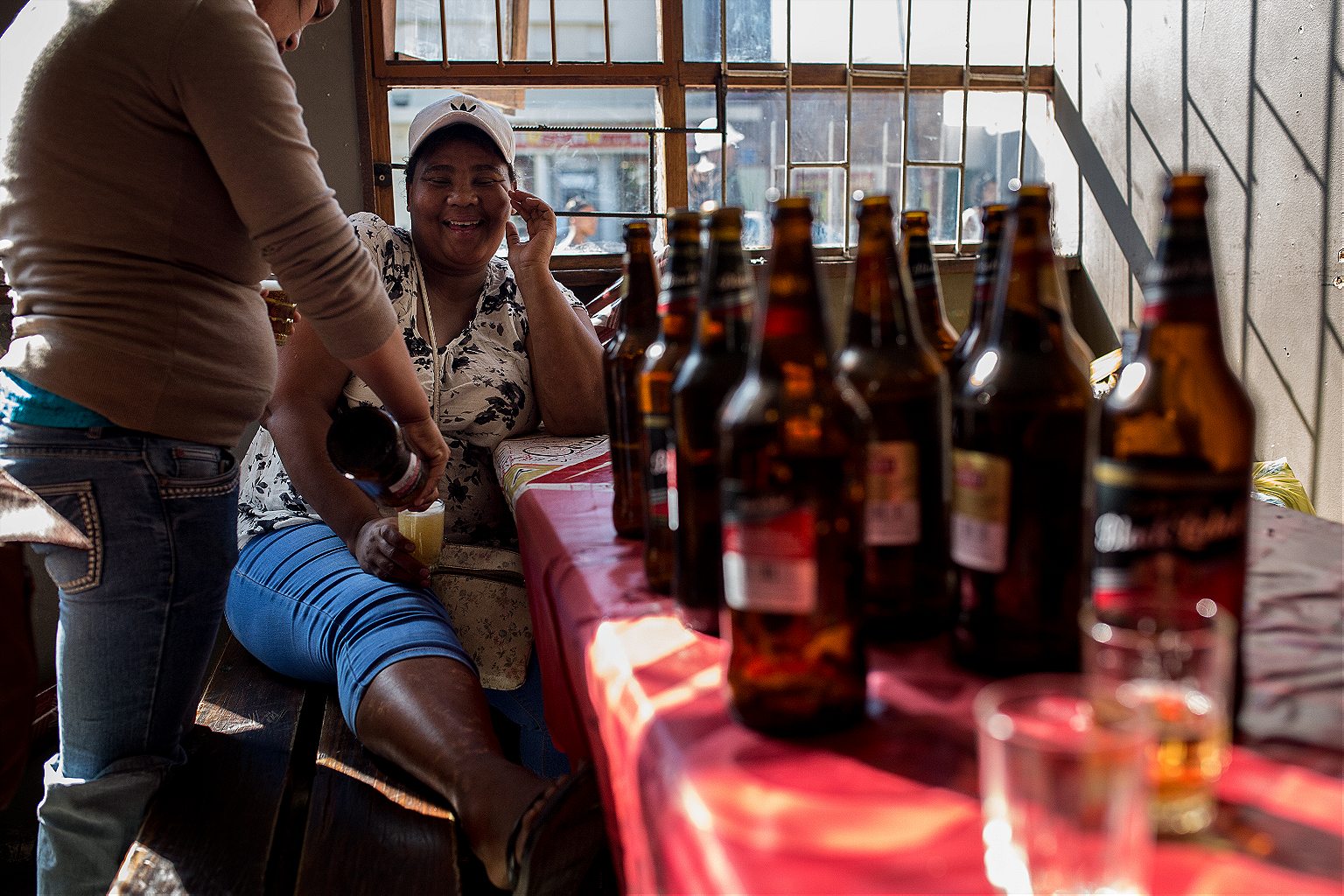
Andrews, who also grew up on a farm, adds that there has been a significant failure on the part of the Department of Labor and the local authorities to adequately address the problem. Teboho Thejane, a spokesperson for the Department of Labor, refutes this claim. He says that his department conducted inspections into allegations of labor law violations and human rights abuses on a number of farms in the Cape Winelands following the release of Bitter Grapes and that it also carries out regular “proactive” inspections, working closely with local law enforcement and unions like CSAAWU. However, Thejane concedes that there are issues with “capacity” in his department, and says that both employers and employees in the farming sector need to be better educated about their rights.
In the case of Colin’s murder, Andrews says that the significant influence and legacy that the Conradie family has in Ashton also obfuscates matters. “We are conscious that in small rural towns you have strong family and friendship ties between the local farmers, the police, the judiciary–the whole white establishment as it were. So it’s often quite difficult for a case like this to achieve any real justice,” she says.
The Conradie family’s extensive history in the area stretches back hundreds of years, and their businesses include wine farms, plant nurseries, factories, and even fast-food outlets. Conradie took over the tomato farm from his ailing father a few years ago. While Andrews says the father was much liked by his workers, she claims that Conradie, a tanned and heavy-browed 38-year-old with ash-brown hair, is despised. “It’s not the first time we’ve heard that he whipped and beat people like this,” she adds.
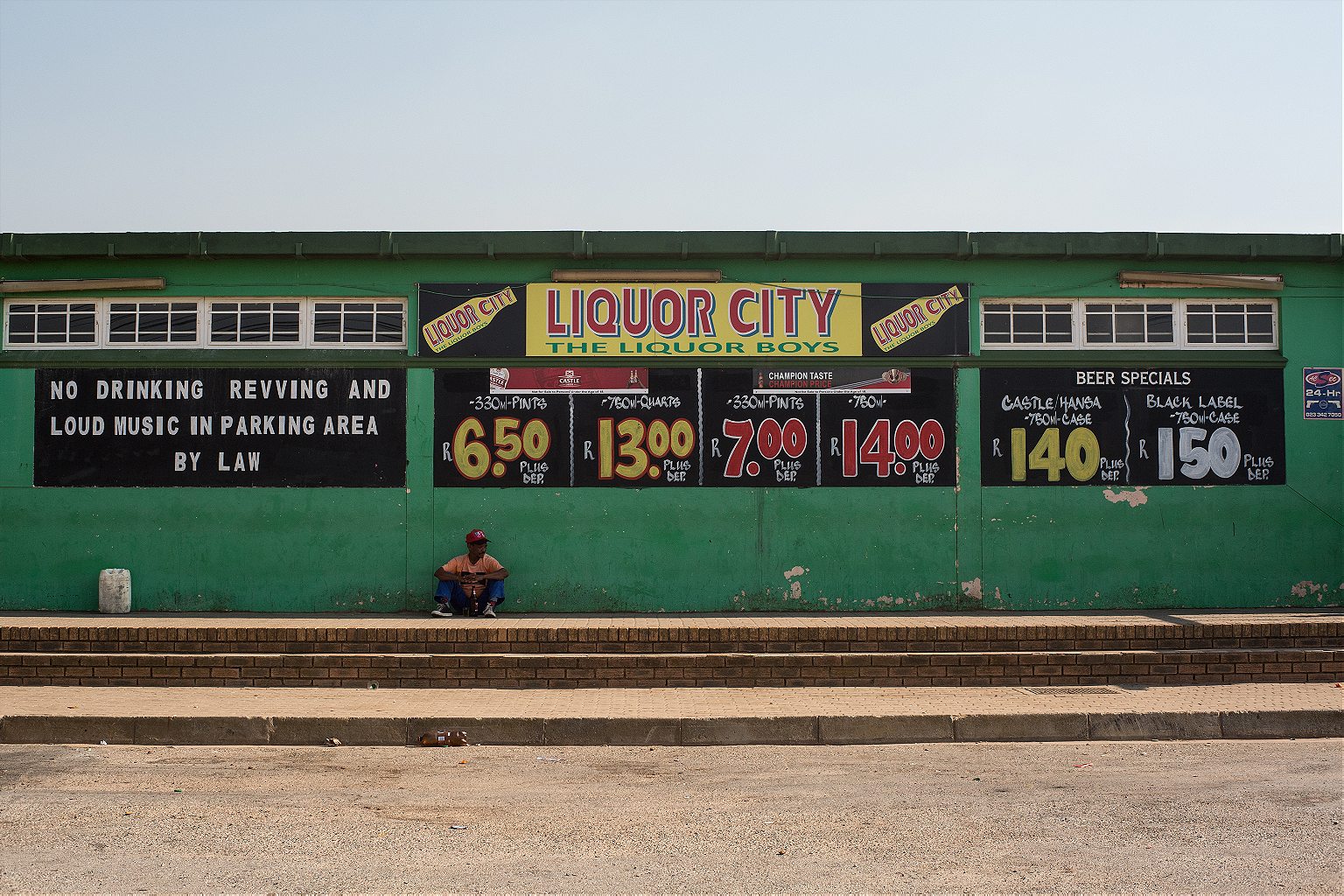
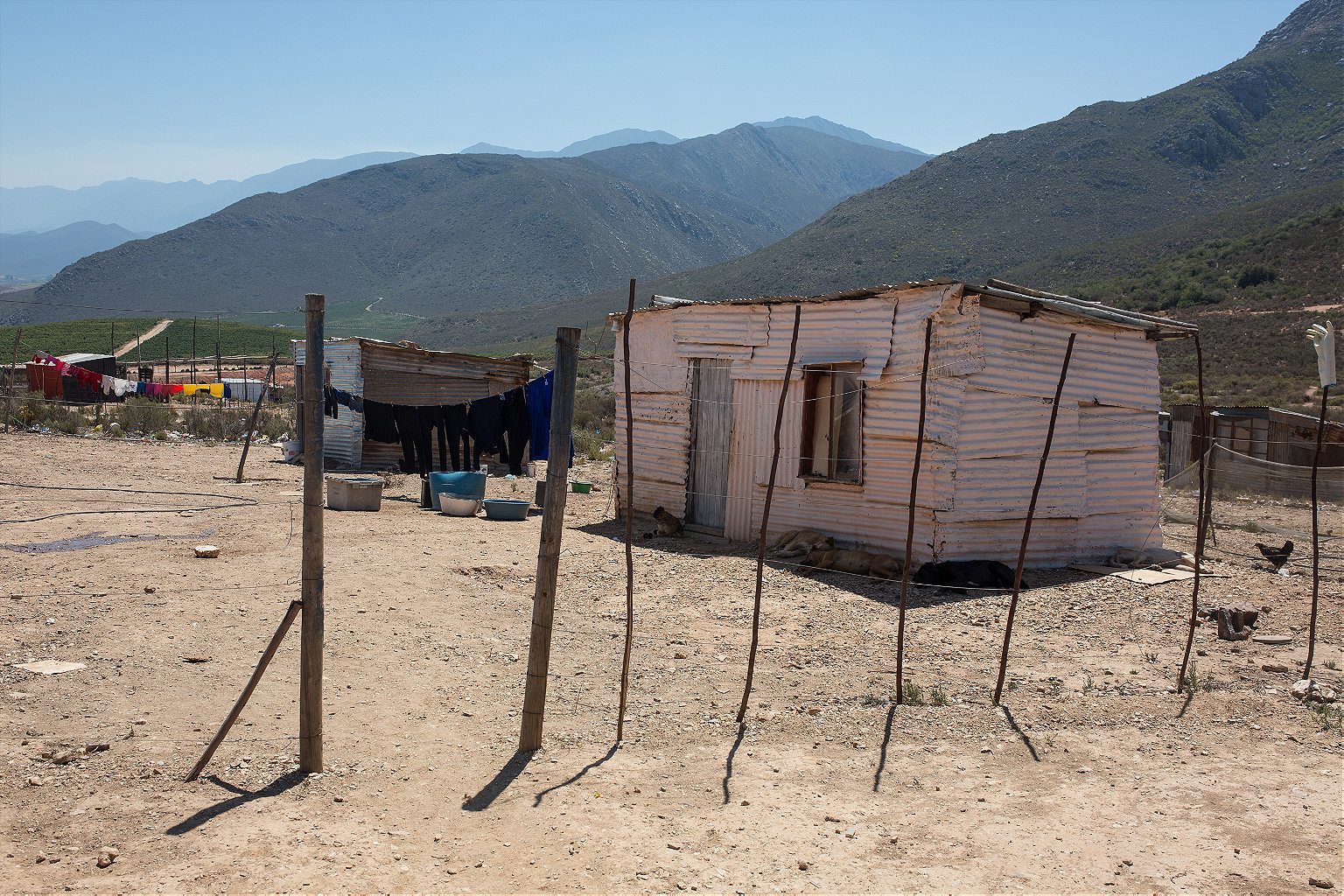
Speaking to Rosina at home at the end of February this year, she tells me that she’s “angry and frustrated” by the lack of progress. A proposed public inquest to determine whether there is sufficient evidence to reopen the murder case has repeatedly been postponed. With tears beginning to stream down her cheeks, she says: “I’m not coping. It’s difficult. There’s no one bringing in any income. There has been no justice for what happened.” She stops speaking and pulls her blouse up to cover her face as her crying intensifies.
A young woman who was sitting on the stoop outside when we arrived comes into the living room and tells us she recently started working on Conradie’s farm. She says that Conradie is very stern and that she’s scared of him: “Even just his facial expression. You feel like he could hurt you.” She squeezes onto the couch between a couple of men with bloodshot eyes who have been silently staring at the wall since we arrived, clearly inebriated. It’s not even midday in the middle of the week. Substance abuse is rife in the Cape Winelands, a legacy inherited from the “dop” system, which for centuries saw farmworkers paid in wine, until the practice was outlawed in the 1960s.
Davids and I say our goodbyes and take a walk up the hill to see Prins, who has been reluctant to have any contact with either of us since he withdrew his case against Conradie. Today, we manage to convince him that we don’t want to cause him any trouble, and he invites us into the yard of his home. His walking is labored and his eyes are constantly and frenziedly darting from side to side as he tells us that he is still in permanent pain from the injuries he sustained two years ago. He lifts up his t-shirt and points to what looks like a fractured rib protruding visibly above his abdomen.
Prins says that he was beaten for over two hours by Conradie, and also shot in the back of the leg when he’d initially tried to flee. He claims that when Conradie first caught him, he had picked up a wrench from the back of his vehicle and contemplated aloud beating him with it, before changing his mind and settling on a piece of light metal tubing inside a cut off length of hosepipe.
Prins’ hospital records confirm that he was admitted and treated for injuries concurrent with assault on March 27, 2015, but was discharged the same day. Jo-Anne Otto, a spokesperson for Western Cape Government Health in the Cape Winelands, would later tell me that this suggests the gunshot wound was fabricated. But Prins counters that he was not properly examined at the hospital, and that they did not conduct any X-rays.
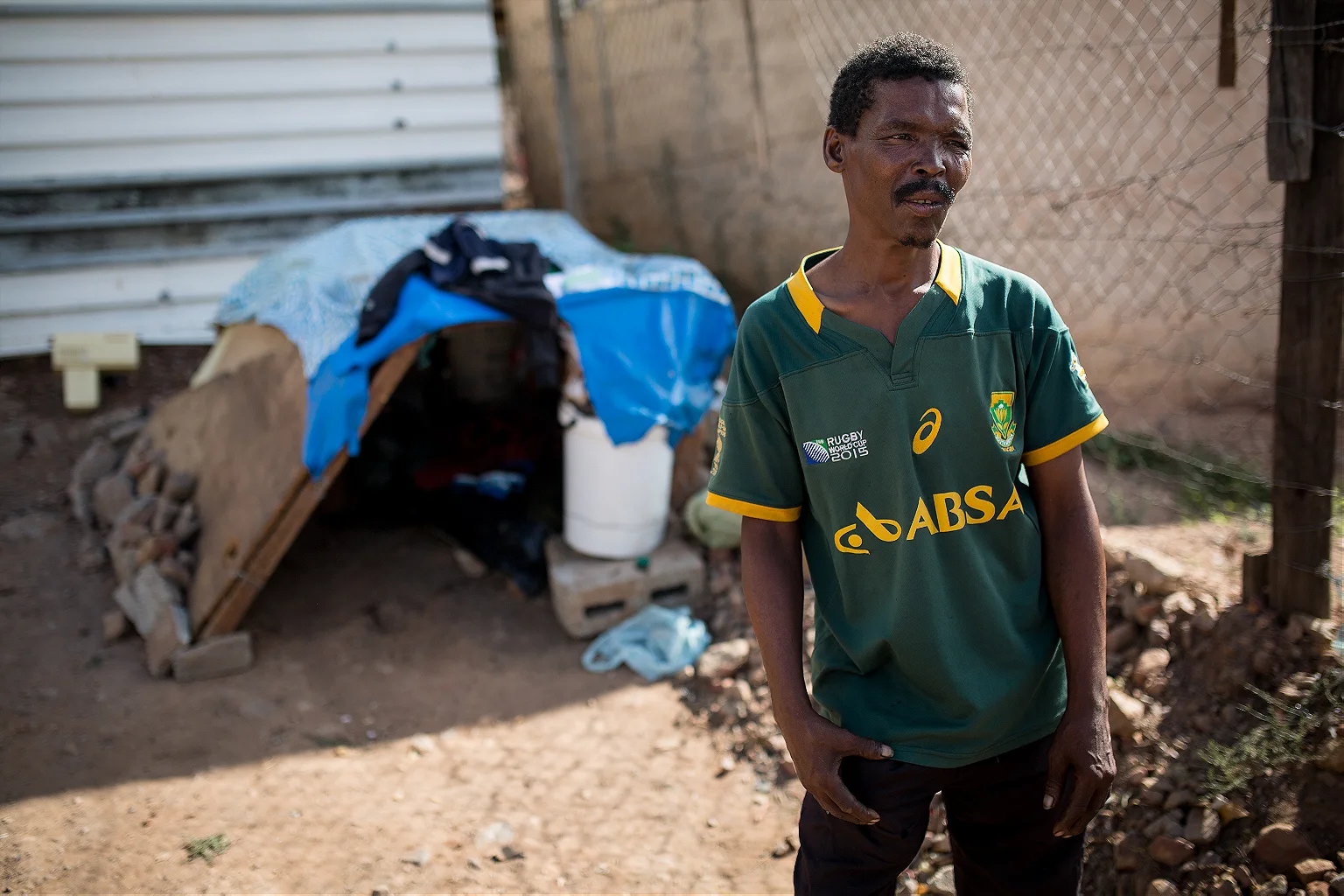
Prins at one time worked for Conradie’s father as a seasonal laborer on the tomato farm, and he remembers Conradie as a shy and introverted teenager always tagging along with his father. Prins has been out of work ever since Conradie assaulted him, though he says he occasionally makes his way down to the petrol station on the main road to see if he can assist the trucks that stop there now and again with loading up boxes of fruit. On a good day, he might get R65 (about $5 U.S.D.) for his assistance. The rest of the time, Prins has to rely on the kindness of others in his community, many of whom are not a great deal better off than he is.
On top of his financial woes, Prins tells us he has been kicked out of the one-bedroom house he was sharing with his two children and their mother; he gently corrects me when I call her his wife. Prins now sleeps on the uneven ground behind the house in a low, makeshift tent made from a few pieces of old chipboard and some ripped blue tarpaulin, held down with piles of rocks. All of his worldly belongings are kept inside, he says. He crawls in and quickly reemerges with a clear plastic bag that contains all of his paperwork from the hospital in Montagu and his bank statements. Prins flicks through the statements from 2016 until he finds one from September, where he shows me a payment of R12,500 (approximately $1000) from Conradie, and another of R10,000 (a little under $800) from Conradie’s lawyer.
With this paltry compensation sum now depleted, Prins is clearly still racked with guilt for taking the settlement and withdrawing his case. Cupping the side of his goateed face with his right hand and shaking his head, he apologizes to Davids for letting her down, and says he was misled by Conradie and his lawyer, who scared him into taking the money. Prins claims the lawyer told him that a case of theft and trespassing had been opened by Conradie against him, and that if he did not withdraw his case against Conradie, his meager compensation would have to be set aside to cover hefty legal fees. Conradie’s lawyer had also previously mentioned these same theft and trespassing charges to me over the phone. But a quick call to Ashton Police Station confirms that no case of theft and trespassing was ever opened.
We leave Prins and take the steep road down the hill and pull up to park outside a wholesale liquor store with broken glass crunching beneath the tires of my car; a few local men sit listlessly on the ground outside with beer bottles between their legs and their backs resting against the wall, which is covered with advertisements for cheap alcohol. We walk over the railway tracks and down the dirt road towards the main entrance of Conradie’s farm. A high electric fence wraps around the perimeter. Davids says Conradie put the fence up in the weeks immediately after Colin’s death.
In a quaint, whitewashed cottage with a well-maintained garden just beside the farm’s perimeter fence, we find Jerome Erasmus, the farm supervisor, who welcomes us inside his home. Erasmus picks up a large bottle of beer from the kitchen table and pours some into a small glass. A wooden cross hangs behind him on the wall.
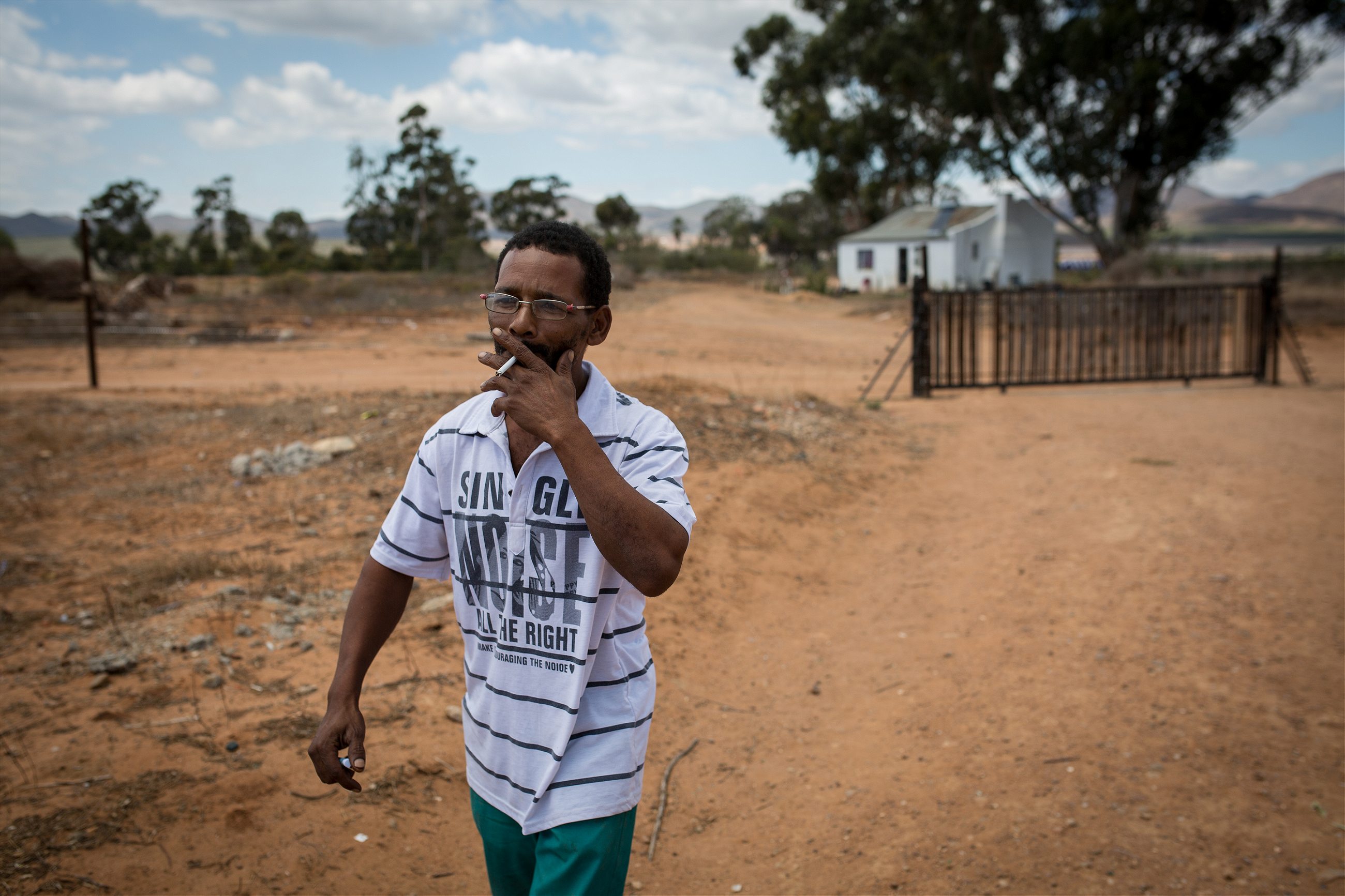
I’d first met Erasmus on a previous visit to Ashton a week before, when he’d lamented the fact that ever since Colin’s death he and his wife had been given the cold shoulder by a number of people they’d once considered friends; Erasmus said there seemed to be a feeling that he was in some way involved. But he was adamant that both he and Conradie were innocent. He was quick to defend Conradie’s character. He said that he had never had any problems with him, that he was approachable, that they occasionally joked with each other. He conceded that he’d seen Conradie hitting Prins, but maintained that he was just trying “to give him a warning.” He also reiterated that both Colin and Prins had crossed beyond the commonly-respected boundaries in their fruit gathering and trespassed onto prime commercial plots, and that they’d been well aware that this might get them in trouble.
Today, though, something, perhaps the beer, seems to have loosened Erasmus’ tongue, and a more conflicted relationship with Conradie begins to emerge. At one point in our conversation, Erasmus refers to Conradie simply as “the bastard.” He also tells us that after the last time we visited he received a call from the farmer’s wife demanding to know who we were and what we were after. When I ask if he can show us the place where Colin’s body was found, Erasmus readily obliges.
We drive around the edge of the tomato farm and down a dusty dirt track to the place where Erasmus says he last saw Colin alive, and where his bag was found by the search party the following morning. Just over the undulating hills behind the vines, thick smoke from a wildfire has begun to fill the sky. We double back on ourselves slowly until Erasmus tells us to stop the vehicle at the exact spot where the body was found—he remembers it clearly. Ripe bunches of white wine grapes hang heavy from the vines on either side of the clearing. Erasmus points to the ground just next to the spot and says that he’d noticed a cigarette butt there when they found the body, and that this continues to trouble him, because he knows that no one who was in the fields that day smokes except for Conradie. He says that the cigarette butt was taken as evidence by Franse. He also says that Franse told him there were signs that Colin had been beaten to death with a blunt object.
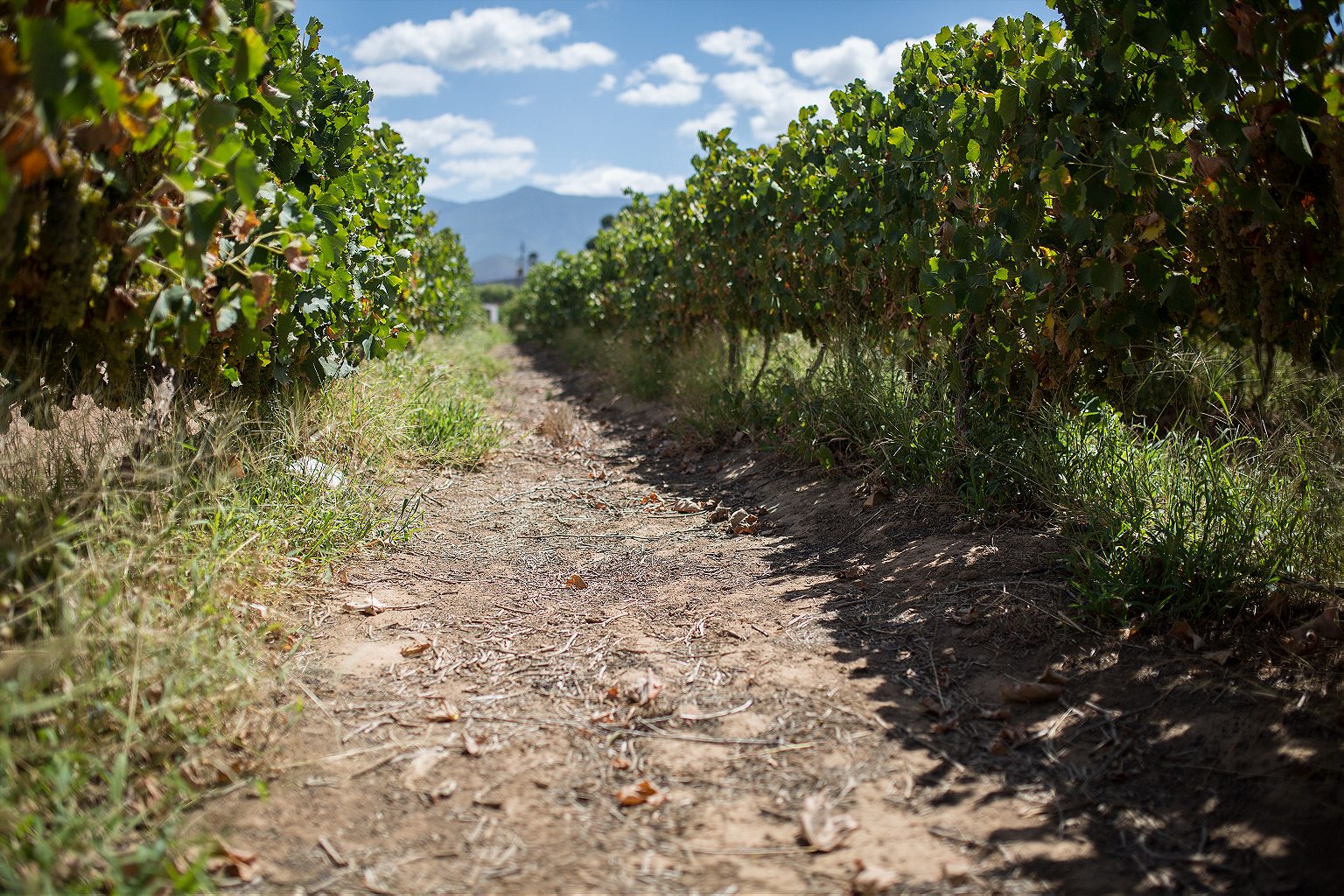
Both the cigarette butt and the blunt object are among the many details that I’ve tried to speak to Franse about. But having initially seemed amenable, Franse has become increasingly brusque and reluctant to assist my investigations, to the point where at the time of writing he’s been ignoring my calls and emails for weeks. When I recently tried to approach him in person at Ashton Police Station, he said he wouldn’t speak to me at all, and that I would have to go through the South African Police Services Western Cape Media Centre, who have subsequently also failed to answer my requests for comment both on the Cloete case and on allegations of corruption within the Ashton police.
Davids remains convinced that this case has been marred by corruption, and cites another case of assault against the farmer that she says mysteriously went missing on Franse’s watch. The case was opened by a Gert Sigelaar. When I call Ashton Police Station, a warrant officer instantly remembers it. He says to hold the line a moment while he pulls up the case number and docket from the system. But after a pause, he says, “That’s very strange, the case isn’t here anymore.”
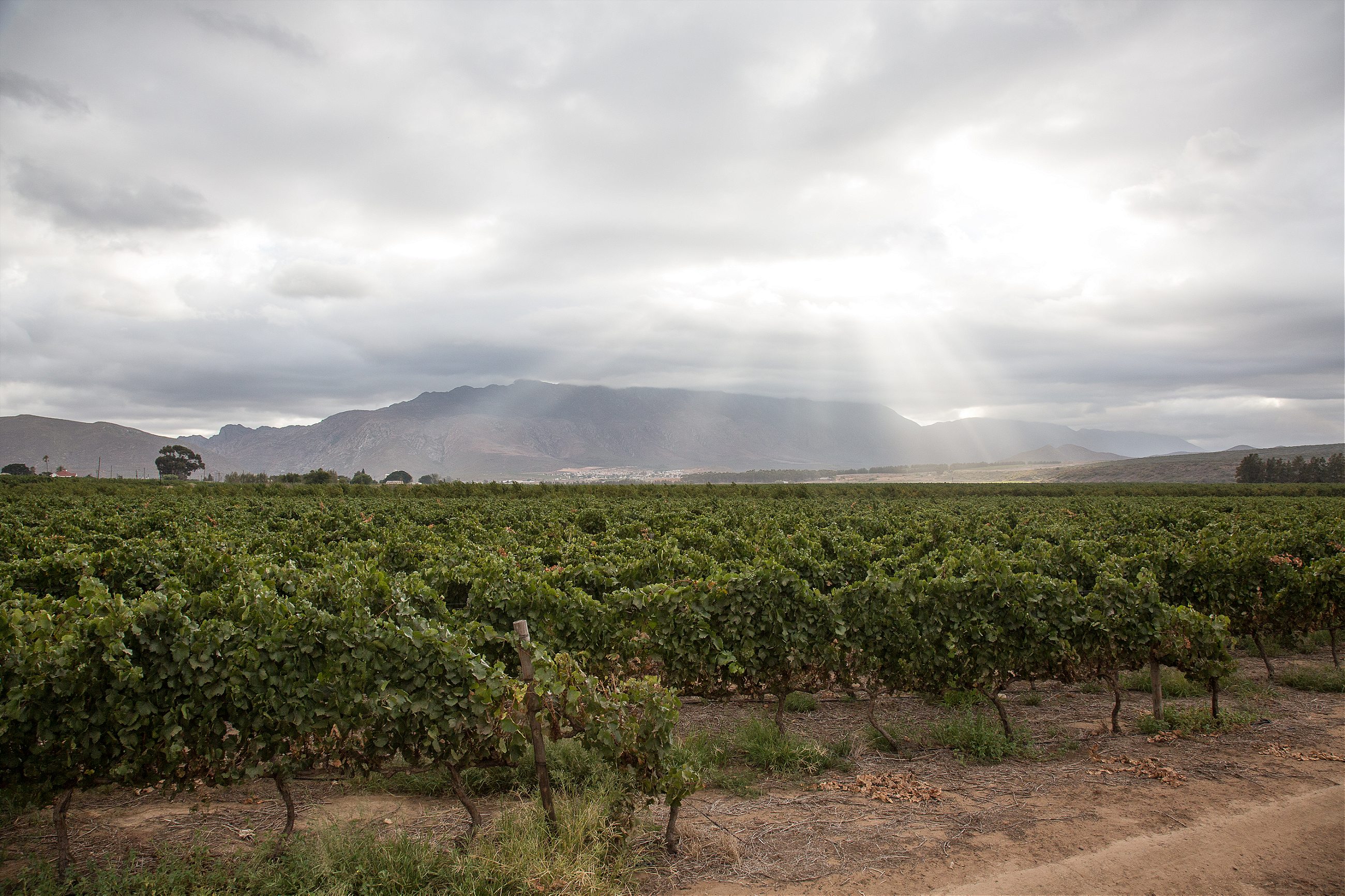
After leaving Erasmus’ house, we meet Sigelaar at his home, which perches precariously beside a low cliff edge with long lines of young citrus trees reaching towards the horizon below. Two young men are passed out on their backs on the front stoop. Sigelaar, whose breath smells strongly of cheap alcohol, says the assault, which happened within a few weeks of Colin’s death, confined him to a wheelchair for several months. Various neighbors, including his sister, back up this claim. However, when Sigelaar returns to his drinking, his sister takes us aside and tells us not to believe everything he says. “He’s my brother, and I love him,” she says, “but he’s not a good person.” She says that when Sigelaar is drunk on the weekends, he is often extremely violent, that he becomes “like a mad dog.”
Sigelaar’s sister also tells me that she believes people like her brother, Prins, and Colin are forcing Conradie’s hand. “He has no choice other than being aggressive because so many people are now going onto his property and taking too much without permission,” she says. She also feels that for all his flaws, Conradie is not the “evil person” that everyone makes him out to be; she says that he often gives his workers and their families tomatoes for free.
This seems to speak to something that Michael Weeder, the former Ashton parish priest, told me in one of our conversations: “Nothing is ever completely black and white. It’s not as simple as black equals good and white equals bad. As we black people inherit a DNA of suffering, I’d imagine that similarly there’s an inherited DNA of conquest and of privilege and of entitlement that time and again has to be deactivated within the white psyche. But there’s also been such a backlash against white farmers post the Mandela golden years. This has resulted in profound anxiety, fear, and fragility. And this is articulated in very vicious ways, especially in areas like the Boland.”
After leaving Sigelaar’s house, we stop in the center of Ashton to buy something to eat at a small fast food joint called Fanie’s Kitchen, which has a few rickety wooden benches outside. Workers dressed in blue overalls stream out of the fruit canning factory across the road for their lunch break. As we eat, Rosina ambles past us and goes into Fanie’s Kitchen to buy some chips. When she comes out again, she stands beside our table for a moment, sucks hard on a cigarette, exhales, and tells us matter-of-factly that the old man who just served all of us is Conradie’s grandfather. Then, without saying goodbye, she throws her cigarette on the pavement, doesn’t stamp it out, and begins her slow walk back up the hill.
